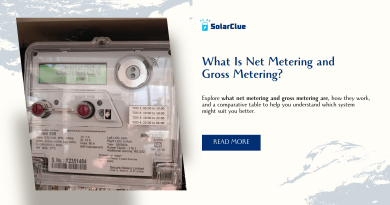Cost Savings with Net Metering: A Complete Guide
Cost Savings with Net Metering: A Complete Guide: The shift towards solar energy is more than just an environmental choice—it’s an economic one. Rising electricity bills have pushed homeowners and businesses to seek alternatives, and installing a solar power system has become a popular solution. Yet, one feature that significantly enhances the financial benefits of solar panels is Net Metering.
Net Metering is a billing mechanism that allows solar power users to send excess electricity back to the grid and receive credit for it. This not only maximizes the value of a solar panel system but also ensures steady cost savings. In this blog, we’ll break down how Net Metering works, its role in reducing electricity costs, and why it’s crucial for anyone investing in solar power.
Table of Contents
- 1 What is Net Metering?
- 2 How Net Metering Works Step-by-Step
- 3 Cost Savings with Net Metering
- 4 Net Metering vs. Non-Net Metering Solar Systems
- 5 Benefits Beyond Cost Savings
- 6
- 7 Challenges and Considerations of Net Metering
- 8 Who Benefits the Most from Net Metering?
- 9 The Role of Net Metering in Promoting Solar Energy
- 10 FAQs on Cost Savings with Net Metering
- 11 Conclusion: Why Net Metering is the Future of Solar Power Savings
What is Net Metering?
Net Metering is a policy that enables consumers with a solar power system to feed surplus electricity into the grid. When your solar panels generate more power than you consume, the excess is sent back, and your electricity meter effectively runs backward. You then receive credits that can offset the electricity you draw from the grid when your solar system is not producing enough (such as at night or during cloudy days).
This simple mechanism ensures you get the most out of your solar energy, allowing you to balance production and consumption without wasting power.
How Net Metering Works Step-by-Step
-
Daytime Generation: Your solar panel system generates electricity when the sun is shining.
-
Excess Power Export: If generation exceeds consumption, the surplus electricity is sent back to the grid.
-
Meter Credits: Your electricity provider credits you for the exported units.
-
Nighttime Consumption: At night, when solar panels aren’t generating, you draw power from the grid.
-
Billing Adjustment: At the end of the billing cycle, your total usage is offset by the credits earned from exporting solar power.
This process makes Net Metering a game changer—it ensures no solar power goes to waste and reduces your reliance on grid power.
Cost Savings with Net Metering
The biggest attraction of Net Metering is cost savings. Without it, any extra electricity generated by your solar power system would be lost unless you had batteries. With Net Metering, however, the grid acts as a virtual battery.
-
Lower Bills: By sending excess solar energy to the grid, you earn credits that cut down your electricity bills.
-
No Need for Large Battery Systems: While batteries are useful, they can be expensive. Net Metering reduces the need for heavy investment in storage.
-
Higher ROI: The credits you earn shorten the payback period of your solar investment.
-
Long-Term Stability: As electricity rates rise, having a solar panel system with Net Metering protects you against future hikes.
For many households and businesses, Net Metering makes the difference between moderate and significant financial benefits from going solar.
Net Metering vs. Non-Net Metering Solar Systems
| Feature | With Net Metering | Without Net Metering |
|---|---|---|
| Excess Power Handling | Exported to grid for credits | Wasted or requires battery |
| Bill Reduction | Significant savings | Moderate savings |
| System ROI | Faster payback | Slower payback |
| Grid Dependence | Reduced | Higher |
| Storage Need | Less urgent | More necessary |
Clearly, Net Metering maximizes the efficiency and economic return of your solar energy system.
Benefits Beyond Cost Savings
While financial savings are the primary attraction, Net Metering offers several additional benefits:
-
Environmental Impact: Encourages renewable energy adoption and reduces carbon footprint.
-
Energy Independence: Less dependence on traditional electricity providers.
-
Grid Stability: Contributes to the overall power supply by feeding clean energy back.
-
Incentivizing Solar Growth: Governments and utilities promote solar power systems by offering Net Metering.
Challenges and Considerations of Net Metering
While the benefits are strong, it’s important to note some challenges:
-
Policy Differences: Not all states or countries have the same Net Metering policies.
-
Credit Rates: Some utilities may not offer full retail credit for excess power.
-
Connection Requirements: Grid approval and compliance may take time.
-
Future Policy Changes: Policies evolve, and it’s important to stay updated.
Even with these considerations, Net Metering remains one of the most effective tools to maximize solar investment.
Who Benefits the Most from Net Metering?
-
Homeowners with High Daytime Usage: Perfect for families running appliances, ACs, or EV chargers during the day.
-
Businesses with Large Roofs: Offices, factories, and warehouses can save massive amounts.
-
Schools & Institutions: With consistent daytime usage, educational institutions maximize returns.
-
Urban Residents: In cities with rising electricity costs, Net Metering provides financial relief.
The Role of Net Metering in Promoting Solar Energy
Net Metering is not just about saving money; it also encourages adoption of solar power on a larger scale. By making solar panel systems financially attractive, it accelerates the transition toward renewable energy. Governments worldwide recognize its importance and continue to expand policies to make solar more accessible.
FAQs on Cost Savings with Net Metering
Q1: Does Net Metering eliminate electricity bills completely?
Not always. While Net Metering significantly reduces bills, you may still pay fixed charges or service fees from your utility provider.
Q2: Is Net Metering available everywhere in India?
No, Net Metering policies differ by state. Some offer full retail credit, while others have caps or limits. Always check your local regulations.
Q3: Can businesses use Net Metering?
Yes, commercial and industrial consumers benefit greatly from Net Metering, especially those with high daytime consumption.
Q4: What happens if I produce more electricity than I use annually?
In most cases, utilities adjust at the end of the year. Some may offer monetary compensation, while others may reset credits.
Q5: Do I still need batteries if I have Net Metering?
Batteries are optional with Net Metering. However, they can provide backup during outages, which Net Metering alone cannot.
Conclusion: Why Net Metering is the Future of Solar Power Savings
Investing in a solar power system already offers significant savings, but with Net Metering, the financial benefits multiply. It ensures your solar panels are working at full potential, reduces dependence on the grid, and speeds up your return on investment.
If you’re considering switching to solar energy, make sure Net Metering is part of your plan—it could be the key to maximizing your cost savings. To explore more about solar solutions, visit solarclue.com and blog.solarclue.com for expert insights and guidance tailored for your journey.




